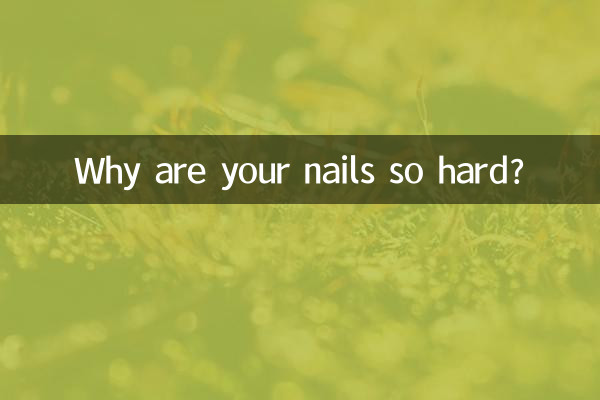Why are your nails so hard?
Recently, discussions about nail health have appeared frequently on social media, especially the topic "why nails are so hard" has attracted widespread attention. Many netizens shared their experiences and asked whether changes in nail hardness were related to health. This article will combine the hot topics and hot content on the Internet in the past 10 days to provide you with a detailed analysis of the causes of hard nails, possible health connections, and how to care for hard nails.
1. Common causes of nail hardness

The hardness of nails is primarily determined by the composition and structure of keratin, but is also affected by:
| reason | illustrate |
|---|---|
| genetic factors | Some people are born with hard nails, which is related to genes. |
| Nutritional intake | Adequate intake of protein, vitamin A, B vitamins and minerals (such as zinc, iron) contributes to nail health. |
| living habits | Regular exposure to water or chemicals can cause nails to become brittle or hard. |
| disease effects | Certain conditions, such as thyroid dysfunction or fungal infections, can change nail texture. |
2. The correlation between hot topics on the Internet in the past 10 days and nail hardness
Through data analysis of social platforms in the past 10 days, we found that the following hot topics are related to nail health:
| hot topics | focus of discussion | relevance |
|---|---|---|
| “What to do if nails are layered” | Nail delamination and easy breakage problems | Delamination of hard nails may also occur due to nutritional deficiencies or external trauma. |
| “The Effect of Collagen Supplementation on Nails” | Benefits of Collagen Supplements | Collagen may improve nail hardness, but only in combination with other nutrients. |
| “What are the white spots on my nails?” | Causes of white spots on nail surface | White spots may be related to trauma or zinc deficiency, as may hard nails. |
3. How to judge whether the nail hardness is normal?
Healthy nails are usually moderately hard, neither easily breakable nor overly hard. If your nails have the following symptoms, it is recommended to pay attention to:
1.Extremely hard and easily cracked: It may be due to excessive accumulation of keratin or lack of elasticity.
2.With color change: If it turns yellow or white, it may indicate fungal infection or other diseases.
3.suddenly hardened: If the nail hardness increases significantly in a short period of time, it is necessary to check whether there is a systemic disease.
4. Care tips for hard nails
For hard nail care, you can refer to the following methods:
| Nursing methods | Specific operations |
|---|---|
| gentle cleansing | Avoid frequent use of strong alkaline detergents and dry your hands promptly after washing. |
| Moisturizing care | Use a nail cream containing urea or shea butter to soften cuticles. |
| Moderate pruning | Use a nail file instead of scissors to avoid forcing hard cuts. |
| diet modification | Increase biotin-rich foods (eg, eggs, nuts) and omega-3 fatty acids. |
5. When do you need medical treatment?
If hard nails are accompanied by the following symptoms, it is recommended to consult a doctor promptly:
1. Nails are significantly thickened and deformed;
2. The surrounding skin is red, swollen and painful;
3. Separation of nails and nail beds;
4. Systemic symptoms such as fatigue, hair loss, etc.
In summary, hard nails may be a normal physiological phenomenon, but they may also be related to health problems. You can better understand the state of your nails by observing accompanying symptoms, adjusting your care habits, and incorporating health topics that are hotly discussed around the Internet. If you have any doubts, seeking professional help promptly is the safest choice.

check the details

check the details